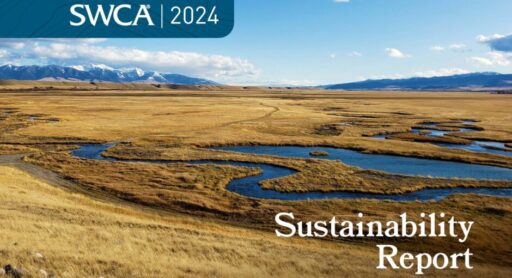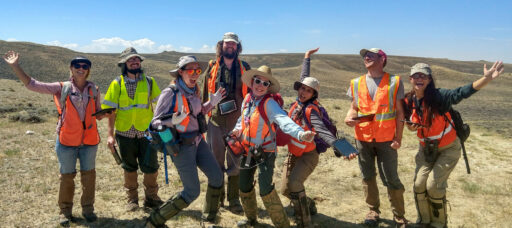2025
Comparably’s Best Company Outlook
* Providing engineering services in these locations through SWCA Environmental Consulting & Engineering, Inc., an affiliate of SWCA.

From the experts we hire, to the clients we partner with, our greatest opportunity for success lies in our ability to bring the best team together for every project.
That’s why:

At SWCA, sustainability means balancing humanity’s social, economic, and environmental needs to provide a healthy planet for future generations.

SWCA employs smart, talented, problem-solvers dedicated to our purpose of preserving natural and cultural resources for tomorrow while enabling projects that benefit people today.

At SWCA, you’re not just an employee. You’re an owner. Everyone you work with has a stake in your success, so your hard work pays off – for the clients, for the company, and for your retirement goals.
Department of the Interior Imposes Sweeping Review Process for Wind and Solar Projects
Amanda Glen is SWCA’s natural resources technical director for biological services and provides strategic guidance on permitting and compliance for matters involving protected wildlife, plants, and habitats. Currently managing a national practice, she has more than 25 years of consulting experience with an emphasis on the Endangered Species Act (ESA) and how compliance with the ESA influences other regulatory programs. Her wealth of experience pertaining to endangered species issues includes research, permitting, consultations, status reviews, and conservation planning. Her experience includes negotiating compliance solutions for critically imperiled species facing potential determinations of jeopardy or adverse modification of designated critical habitats. She has led efforts to delist species no longer requiring the protections of the ESA when supported by sound science, and has been involved in voluntary conservation planning to help preclude the need to list species. Amanda frequently presents at regional and national conferences on matters related to the ESA, including new listings, regulatory and policy changes, and trends in compliance strategies.

Matt Petersen is the National Environmental Policy Act (NEPA) Technical Director for SWCA. Matt has 31 years of experience as a resource specialist and has managed or provided NEPA oversight for over 30 large-scale environmental impact statements (EISs), including projects in Arizona, Alaska, Colorado, Idaho, New Hampshire, Utah, Vermont, Texas, New Mexico, California, and Wyoming. This NEPA experience includes work with most major federal agencies and encompasses resource management plans (RMPs), ski areas expansions, fire management plans, stream restoration, mining, oil and gas, pipelines, transmission lines, wind farms, airports, and power plants. Matt has taught custom NEPA seminars for the Bureau of Land Management (BLM), U.S. Forest Service (USFS), U.S. Department of Transportation Maritime Administration, and the Federal Aviation Administration (FAA). Matt has developed and routinely teaches several open-enrollment NEPA courses to industry professionals, lawyers, and agency staffs. In addition, Matt is a regular instructor on NEPA impact analysis and third-party consulting for the BLM National Training Center (NTC). Matt recently developed the BLM National Training Center courses “NEPA Analysis for EAs” and “Kick-Start Your RMP,” both of which Matt has taken on the road to BLM field offices throughout the continental Unites States and Alaska. Technical expertise includes aquatic habitat impact assessment, mitigation, and restoration; hydrological modeling and analysis; and wetland delineation, mapping, and impact analysis. Matt is also experienced in the use and application of analytical models for quantitatively assessing natural resources impacts through the NEPA process.

Scott is a Senior Technical Director who leads Cultural Resources Management, Regulatory Affairs, and Indigenous Government Relations across SWCA. He has developed his expertise and acumen since entering the field in 1990 and has provided leadership in these areas at SWCA since 2001.

Ross is a respected expert in infrastructure permitting with a decade of experience in project, program, and policy development, management, and implementation. His primary focus has been on streamlining and enhancing the transparency of permitting decisions across federal, state, tribal, and local governments while prioritizing public input and environmental resources.





On July 15, 2025, the U.S. Department of the Interior (DOI) issued a memo titled Departmental Review Procedures for Decisions, Actions, Consultations, and Other Undertakings Related to Wind and Solar Energy Facilities. This directive, issued in accordance with recent executive and secretarial orders, requires that all decisions, actions, consultations, and approvals related to wind and solar energy projects with a DOI nexus undergo review at the highest levels of the agency. Routine permitting and review activities must now be elevated to the Secretary’s office, significantly altering standard review timelines and agency workflows.
The memo lists 69 categories of actions now subject to this additional review and approval process including National Environmental Protection Act (NEPA) documentation, right-of-way approvals, lease actions, consultation under the Endangered Species Act (ESA) and National Historic Preservation Act (NHPA), visual impact assessments, and more. This directive may also extend to coordination with state or local environmental review processes, as well as to other types of infrastructure that primarily support or are functionally tied to wind or solar projects.
Federal agencies, including the U.S. Fish and Wildlife Service (USFWS), have already begun implementing this directive. For example, USFWS has temporarily disabled automated tools in the IPaC system for renewable energy projects, affecting official species lists generation and consultation workflows. These and other disruptions are beginning to impact project schedules and create uncertainty across the industry.
SWCA is actively tracking this policy’s implementation and working with our clients to navigate the resulting uncertainty and determine impacts to project schedules, costs, and overall timeframes for development. We recommend the following steps:
SWCA is closely monitoring DOI’s implementation of the memo and its effects across regions and agencies. We are ready to help you assess project exposure, communicate with federal partners, and manage risk in your development timeline.
Please reach out to your project manager or any of SWCA’s regulatory specialists to the left to discuss how this directive may affect your projects and how we can partner with you to support your long-term objectives. SWCA remains committed to providing consistent and in-depth expertise as the regulatory landscape evolves.